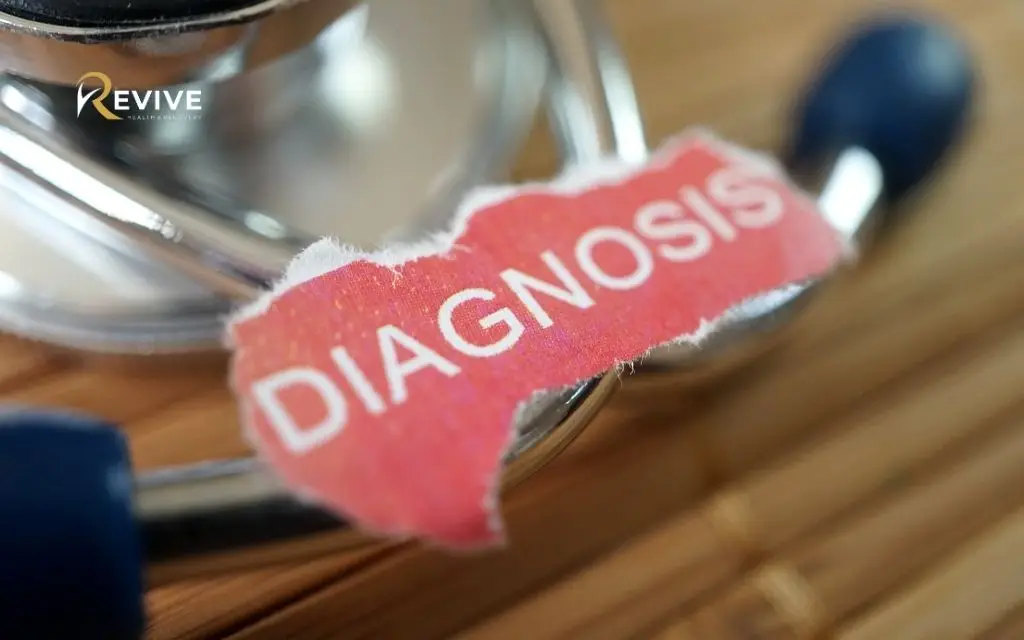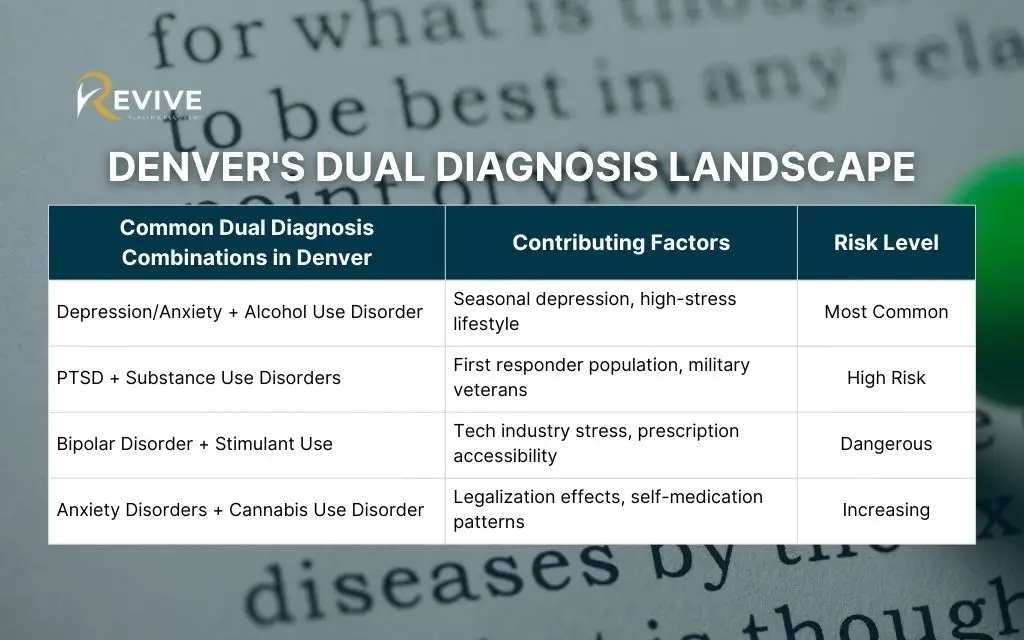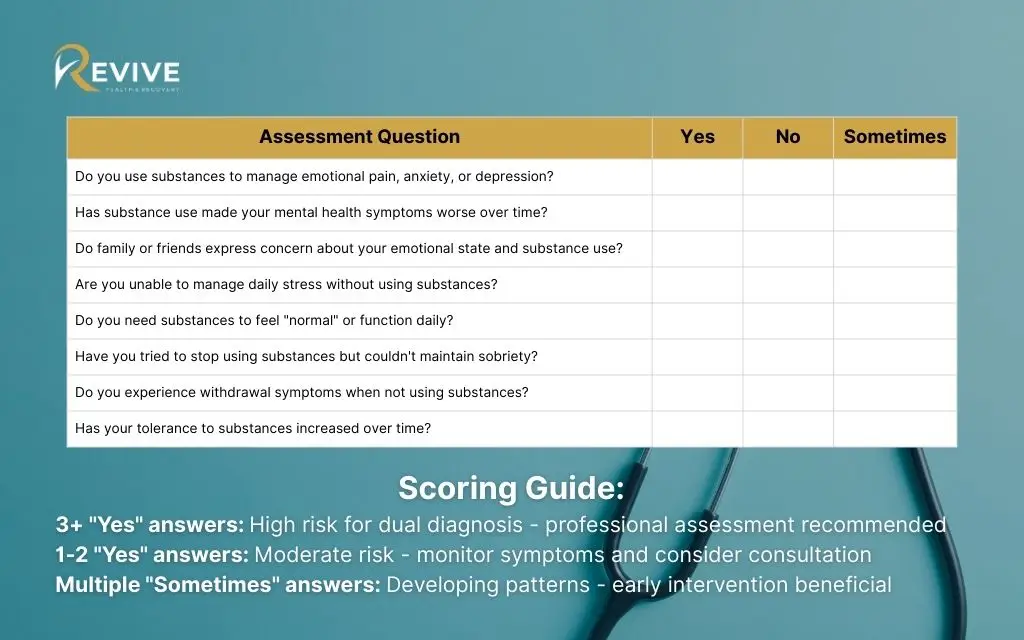Are you struggling with both mental health challenges and substance use, wondering if they’re connected? You’re not alone. Thousands of Denver residents face double-condition diagnosis, a condition where mental health disorders and substance use disorders occur simultaneously. This bidirectional relationship creates unique challenges that traditional single-condition treatments often fail to address effectively.
Recognizing signs of dual diagnosis marks the crucial first step toward recovery. Unlike simple comorbidity, dual diagnosis conditions actively influence and worsen each other, requiring specialized integrated treatment approaches. The good news? Denver residents have access to comprehensive, compassionate care through evidence-based outpatient programs designed specifically for co-occurring disorders.
This guide will help you identify dual diagnosis symptoms, understand when professional help becomes necessary, and discover how local treatment can transform your life. Recovery is possible, and it starts with recognizing the signs.
Understanding Dual Diagnosis: More Than Just Addiction or Mental Health
What Makes Dual Diagnosis Different
Dual diagnosis represents the simultaneous presence of a mental health disorder and a substance use disorder in one person. This condition affects approximately 25.8% of adults with psychiatric disorders and 36.5% of those with substance use disorders nationwide.

The key difference lies in how these conditions interact. Rather than existing separately, they create a complex cycle where each condition triggers and amplifies the other. Someone might use alcohol to manage anxiety symptoms, but alcohol use then worsens anxiety over time, creating increased dependence on substances for relief.
Traditional treatment approaches that address only addiction or only mental health often fail because they ignore this interconnected relationship. Effective dual diagnosis treatment requires simultaneous, integrated care that addresses both conditions together.
Ready to break this cycle? Contact Revive Health Recovery at (303) 268-4655 to learn about our integrated approach to dual diagnosis treatment in Denver.
Denver’s Dual Diagnosis Landscape

Denver’s unique environment contributes to specific dual diagnosis patterns. Colorado’s high altitude can affect mood regulation and medication effectiveness, while the outdoor culture sometimes masks substance use as recreational activity.
| Common Dual Diagnosis Combinations in Denver | Contributing Factors | Risk Level |
| Depression/Anxiety + Alcohol Use Disorder | Seasonal depression, high-stress lifestyle | Most Common |
| PTSD + Substance Use Disorders | First responder population, military veterans | High Risk |
| Bipolar Disorder + Stimulant Use | Tech industry stress, prescription accessibility | Dangerous |
| Anxiety Disorders + Cannabis Use Disorder | Legalization effects, self-medication patterns | Increasing |
Environmental factors unique to Colorado create additional challenges. The legalization of cannabis has led to increased dual diagnosis cases involving marijuana use disorders combined with anxiety or depression. High-stress industries like tech and healthcare contribute to prescription drug misuse alongside mental health conditions.
Recognizing the Warning Signs: Common Dual Diagnosis Symptoms
Behavioral and Emotional Red Flags
Dual diagnosis symptoms often appear gradually, making early recognition challenging. Watch for mood swings that extend beyond normal emotional fluctuations. These aren’t typical ups and downs but dramatic shifts that seem disproportionate to circumstances.
Increasing substance use during emotional distress signals a concerning pattern. When alcohol, drugs, or prescription medications become the primary coping mechanism for stress, anxiety, or depression, dual diagnosis may be developing.
Social withdrawal and isolation patterns emerge as both conditions worsen. People experiencing dual diagnosis often pull away from family, friends, and activities they once enjoyed. This isolation stems from shame, fear of judgment, or the consuming nature of managing both conditions.
Changes in sleep patterns and appetite frequently accompany dual diagnosis. Insomnia followed by excessive sleeping, or loss of appetite alternating with binge eating, often indicate the brain struggling to regulate basic functions while managing both substance use and mental health symptoms.
Physical and Cognitive Symptoms
Concentration difficulties become increasingly apparent as dual diagnosis progresses. Simple tasks like reading, following conversations, or completing work assignments become challenging. Memory problems extend beyond occasional forgetfulness to significant gaps in short-term memory.
Physical health decline manifests through various symptoms. Frequent headaches, digestive issues, unexplained aches and pains, or changes in physical appearance often accompany dual diagnosis. These physical symptoms result from both substance use effects and the body’s response to chronic mental health stress.
Tolerance and withdrawal signs indicate the substance use component of dual diagnosis. Needing increasing amounts of substances to achieve the same effect, or experiencing physical or emotional discomfort when unable to use substances, suggests dependency has developed.
Experiencing these symptoms? Don’t wait for them to worsen. Call Revive Health Recovery at (303) 268-4655 for a confidential assessment today.
Social and Occupational Impact
Relationship deterioration patterns often provide clear dual diagnosis indicators. Arguments increase in frequency and intensity, trust erodes, and emotional intimacy decreases. Family members and friends may express concern about changes in behavior or personality.
Work performance changes become noticeable to colleagues and supervisors. Missed deadlines, increased absences, difficulty concentrating during meetings, or conflicts with coworkers may result from dual diagnosis symptoms affecting professional functioning.
Financial management issues emerge as both conditions require resources. Spending money on substances while potentially losing income due to decreased work performance creates financial strain. Medical expenses, legal costs, or damaged property may compound these difficulties.
Legal or safety concerns develop when dual diagnosis affects judgment and decision-making. DUI charges, public intoxication, domestic disputes, or workplace accidents may occur when both conditions remain untreated.
Self-Assessment: Evaluating Your Mental Health and Addiction Risk
Personal Reflection Questions
Use this self-assessment checklist to evaluate your dual diagnosis risk. Answer honestly:
| Assessment Question | Yes | No | Sometimes |
| Do you use substances to manage emotional pain, anxiety, or depression? | |||
| Has substance use made your mental health symptoms worse over time? | |||
| Do family or friends express concern about your emotional state and substance use? | |||
| Are you unable to manage daily stress without using substances? | |||
| Do you need substances to feel “normal” or function daily? | |||
| Have you tried to stop using substances but couldn’t maintain sobriety? | |||
| Do you experience withdrawal symptoms when not using substances? | |||
| Has your tolerance to substances increased over time? |
Scoring Guide:
- 3+ “Yes” answers: High risk for dual diagnosis – professional assessment recommended
- 1-2 “Yes” answers: Moderate risk – monitor symptoms and consider consultation
- Multiple “Sometimes” answers: Developing patterns – early intervention beneficial

Monitoring Changes Over Time
Track mood and substance use patterns by keeping a simple daily journal. Note emotional states, substance use amounts and triggers, sleep quality, and overall functioning. Patterns often emerge that reveal the connection between mental health and substance use.
Recognize escalation signs including increased frequency or amount of substance use, worsening mental health symptoms despite substance use, or needing substances earlier in the day or for previously manageable situations.
Patterns become concerning when substance use becomes the primary coping mechanism for any emotional difficulty, when mental health symptoms worsen despite treatment, or when daily functioning requires substance use to maintain normalcy.
Special Considerations for First Responders
First responders face unique dual diagnosis risks due to occupational trauma exposure. The nature of emergency response work creates constant exposure to traumatic situations that can lead to PTSD, depression, or anxiety disorders.
PTSD and substance use connections appear frequently in first responder populations. Alcohol use often begins as a way to decompress after difficult shifts but can develop into dependency when combined with untreated PTSD symptoms.
Departmental culture sometimes stigmatizes mental health treatment, leading to self-medication with substances instead of seeking professional help. This creates dangerous dual diagnosis patterns that require specialized understanding of first responder challenges.
First responders experiencing these challenges: Revive Health Recovery understands your unique needs. Call (303) 268-4655 for confidential, specialized treatment that respects your service.
When to Seek Professional Help: Recognizing the Need for Dual Diagnosis Treatment
Immediate Warning Signs Requiring Urgent Care
| Warning Sign | Urgency Level | Action Required |
| Suicidal thoughts or behaviors | EMERGENCY | Call 911 or go to ER immediately |
| Psychotic symptoms (hallucinations, delusions) | EMERGENCY | Seek immediate medical attention |
| Dangerous substance use patterns | URGENT | Contact treatment center within 24 hours |
| Complete functional breakdown | URGENT | Professional assessment needed immediately |
| Combining multiple substances | HIGH PRIORITY | Schedule assessment within 48 hours |
| Using substances in hazardous situations | HIGH PRIORITY | Contact treatment center promptly |
Signs It’s Time for Professional Assessment
| Warning Sign | What It Means | Next Step |
| Failed self-help attempts | Dual diagnosis has progressed beyond individual management | Professional assessment needed |
| Worsening symptoms despite efforts | Current coping strategies are ineffective | Integrated treatment required |
| Impact on family and relationships | Symptoms affecting loved ones and connections | Family-inclusive treatment recommended |
| Legal or occupational consequences | Serious dual diagnosis requiring immediate intervention | Contact Revive Health Recovery |
Why Choose Revive Health Recovery in Denver
Outpatient treatment advantages allow you to maintain work, family, and community connections while receiving comprehensive dual diagnosis care. Our flexible scheduling accommodates Denver residents’ busy lifestyles while providing intensive treatment when needed.
Integrated approach benefits ensure that both mental health and substance use disorders receive simultaneous treatment. Rather than addressing conditions separately, our team coordinates care to break the cycle that keeps dual diagnosis active.
Local accessibility and community understanding make treatment convenient and culturally relevant. Our Denver location at 1427 S Federal Blvd means shorter travel times and treatment that understands Colorado’s unique challenges and resources.
Evidence-based treatment modalities include cognitive behavioral therapy, dialectical behavior therapy, motivational interviewing, and trauma-focused approaches. These proven methods address both conditions effectively when applied in integrated dual diagnosis treatment.
Take the first step: Contact Revive Health Recovery at (303) 268-4655 or email contact@revivehealthrecovery.com to schedule your confidential assessment today.
FAQs about signs of dual diagnosis
What is the most common dual diagnosis combination?
Depression or anxiety paired with alcohol use disorder represents the most frequent dual diagnosis combination, affecting approximately 40% of individuals seeking dual diagnosis treatment in Denver. This combination often develops when people use alcohol to self-medicate emotional pain, creating a dangerous cycle where alcohol temporarily relieves symptoms but ultimately worsens depression and anxiety. Revive Health Recovery specializes in treating this common combination through integrated therapy approaches that address both conditions simultaneously.
Can I recover from dual diagnosis without inpatient treatment?
Yes, outpatient dual diagnosis treatment can be highly effective for many people. Revive Health Recovery’s outpatient model has demonstrated excellent success rates while allowing clients to maintain their work, family, and community connections. Our intensive outpatient programs provide comprehensive care including individual therapy, group sessions, family support, and medical management when needed. This flexibility often leads to better long-term outcomes because clients practice recovery skills in real-world situations while receiving professional support.
How long does dual diagnosis treatment typically take?
Dual diagnosis treatment duration varies based on individual needs, symptom severity, and personal circumstances. Most clients at Revive Health Recovery participate in intensive treatment for 3-6 months, followed by ongoing support services. Some people need longer initial treatment periods, while others transition to less intensive care more quickly. Our team creates individualized treatment plans that adjust based on progress and changing needs, ensuring each person receives appropriate care duration for lasting recovery.
Will my insurance cover dual diagnosis treatment in Denver?
Most insurance plans provide coverage for dual diagnosis treatment, including both mental health and substance use disorder services. Coverage levels vary depending on your specific plan and benefits. Revive Health Recovery accepts many insurance plans and our team helps verify your benefits and maximize coverage. We also offer payment options for services not covered by insurance. Call (303) 268-4655 to discuss your insurance coverage and learn about available options.
What makes dual diagnosis treatment different from regular addiction treatment?
Dual diagnosis treatment addresses mental health and substance use disorders simultaneously through integrated care, while traditional addiction treatment focuses primarily on substance use. This integrated approach is essential because treating only one condition often leads to relapse in both. At Revive Health Recovery, our dual diagnosis specialists coordinate mental health therapy, addiction counseling, medication management, and family support to address the complex interactions between conditions. This comprehensive approach leads to better outcomes and reduced relapse rates.
Take the Next Step: Revive Health Recovery is Here for Denver
Your Journey to Recovery Starts Today
Recovery from dual diagnosis is not only possible but probable with the right treatment approach. Thousands of people successfully manage both mental health and substance use disorders through integrated treatment that addresses both conditions simultaneously.
Revive Health Recovery brings specialized dual diagnosis expertise to Denver residents who need comprehensive, compassionate care. Our team understands the complex relationship between mental health and substance use disorders, providing treatment that breaks the cycle keeping you stuck.
We’re available 24/7 to answer questions, provide support, and schedule immediate assessments. Your recovery journey can begin today with a simple phone call. Don’t let another day pass struggling with symptoms that have effective treatment solutions.
Contact Revive Health Recovery
| Contact Method | Details | Availability |
| Phone | (303) 268-4655 | 24/7 |
| contact@revivehealthrecovery.com | Response within 4 hours | |
| Address | 1427 S Federal Blvd, Denver, CO 80219 | Walk-ins welcome |
| Online Assessment | Free Dual Diagnosis Symptom Assessment | Available now |
Take Our Free Dual Diagnosis Symptom Assessment – Complete our comprehensive online screening tool that provides immediate feedback and connects you directly to our professional team for evaluation and treatment planning.
Conclusion
Recognizing signs of dual diagnosis represents the most important step toward recovery and improved quality of life. The warning signs discussed throughout this guide – from behavioral changes to physical symptoms to social impacts – all point to treatable conditions that respond well to integrated care approaches.
Denver residents experiencing dual diagnosis symptoms have access to comprehensive, evidence-based treatment right in their community through Revive Health Recovery’s specialized outpatient programs. Our integrated approach addresses both mental health and substance use disorders simultaneously, providing the coordinated care necessary for lasting recovery.
Remember that dual diagnosis is not a character flaw or personal failing, but a medical condition that requires professional treatment. With proper care, people with dual diagnosis can achieve full recovery, rebuild relationships, return to productive work, and enjoy meaningful lives. Your recovery journey can begin today with one phone call to (303) 268-4655.



